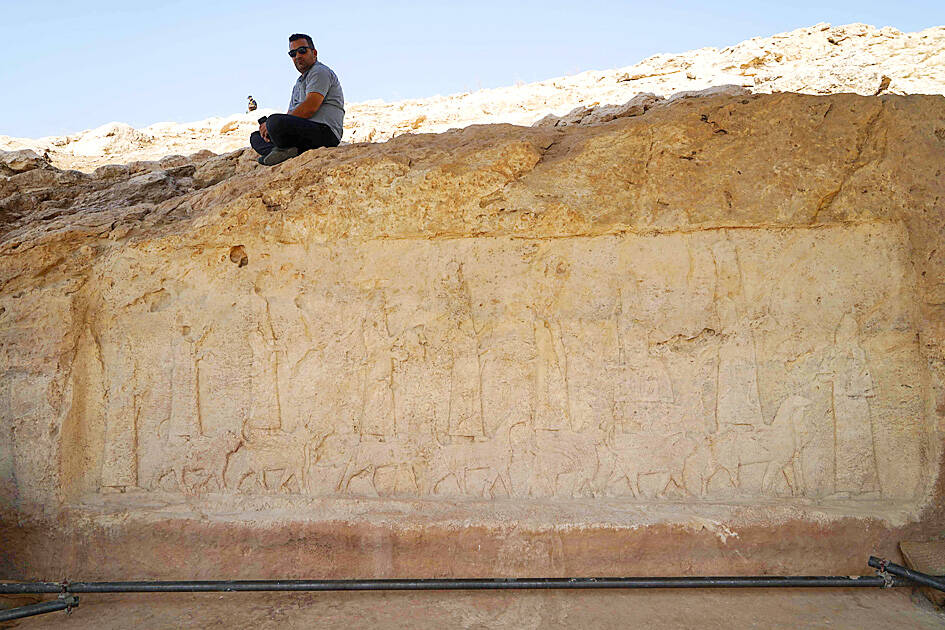Authorities in northern Iraq on Sunday unveiled an “archeological park” of 2,700-year-old carvings from the rule of the Assyrians, including showing kings praying to the gods.
The 13 stunning monumental rock-carved bas-reliefs were cut into the walls of an irrigation canal that stretches for about 10km at Faida in northern Iraq.
The panels, measuring 5m wide and 2m tall, date from the reigns of Sargon II (721-705 BC) and his son Sennacherib.

Photo: AFP
“Perhaps in the future others will be discovered,” said Bekas Brefkany, from the department of antiquities in Dohuk, in Iraq’s northern autonomous Kurdistan region.
Faida is the first of five parks the regional authorities hope to create, part of a project aimed to be “a tourist attraction and a source of income,” Brefkany said.
The carvings were unearthed during several digs over the past few years by archeologists from Kurdistan and Italy’s University of Udine.
Last year, Daniele Morandi Bonacossi, professor of Near Eastern archeology at the university, said that while there were other rock reliefs in Iraq, none were so “huge and monumental” as these.
Iraq was the birthplace of some of the world’s earliest cities.
As well as Assyrians ,it was once home to Sumerians and Babylonians, and to among humankind’s first examples of writing.
However, in recent years it has suffered as a location for smugglers of ancient artifacts.
Looters decimated the country’s ancient past, including after the 2003 US-led invasion.
Then, from 2014 and 2017, the Islamic State group demolished dozens of pre-Islamic treasures with bulldozers, pickaxes and explosives.
They also used smuggling to finance their operations.
Some countries are slowly returning stolen items.
Last year, the US returned about 17,000 artifacts to Iraq, pieces that mostly dated from the Sumerian period about 4,000 years ago.

Thousands gathered across New Zealand yesterday to celebrate the signing of the country’s founding document and some called for an end to government policies that critics say erode the rights promised to the indigenous Maori population. As the sun rose on the dawn service at Waitangi where the Treaty of Waitangi was first signed between the British Crown and Maori chiefs in 1840, some community leaders called on the government to honor promises made 185 years ago. The call was repeated at peaceful rallies that drew several hundred people later in the day. “This government is attacking tangata whenua [indigenous people] on all

RIGHTS FEARS: A protester said Beijing would use the embassy to catch and send Hong Kongers to China, while a lawmaker said Chinese agents had threatened Britons Hundreds of demonstrators on Saturday protested at a site earmarked for Beijing’s controversial new embassy in London over human rights and security concerns. The new embassy — if approved by the British government — would be the “biggest Chinese embassy in Europe,” one lawmaker said earlier. Protester Iona Boswell, a 40-year-old social worker, said there was “no need for a mega embassy here” and that she believed it would be used to facilitate the “harassment of dissidents.” China has for several years been trying to relocate its embassy, currently in the British capital’s upmarket Marylebone district, to the sprawling historic site in the

‘IMPOSSIBLE’: The authors of the study, which was published in an environment journal, said that the findings appeared grim, but that honesty is necessary for change Holding long-term global warming to 2°C — the fallback target of the Paris climate accord — is now “impossible,” according to a new analysis published by leading scientists. Led by renowned climatologist James Hansen, the paper appears in the journal Environment: Science and Policy for Sustainable Development and concludes that Earth’s climate is more sensitive to rising greenhouse gas emissions than previously thought. Compounding the crisis, Hansen and colleagues argued, is a recent decline in sunlight-blocking aerosol pollution from the shipping industry, which had been mitigating some of the warming. An ambitious climate change scenario outlined by the UN’s climate

A deluge of disinformation about a virus called hMPV is stoking anti-China sentiment across Asia and spurring unfounded concerns of renewed lockdowns, despite experts dismissing comparisons with the COVID-19 pandemic five years ago. Agence France-Presse’s fact-checkers have debunked a slew of social media posts about the usually non-fatal respiratory disease human metapneumovirus after cases rose in China. Many of these posts claimed that people were dying and that a national emergency had been declared. Garnering tens of thousands of views, some posts recycled old footage from China’s draconian lockdowns during the COVID-19 pandemic, which originated in the country in late